|
|
|
Sort Order |
|
|
|
Items / Page
|
|
|
|
|
|
|
| Srl | Item |
| 1 |
ID:
084069


|
|
|
|
|
| Publication |
2008.
|
| Summary/Abstract |
This article claims that all of the objectives put forth by the Egyptian revolutionary regime appeared in the leftist journal al-Fajr al-Jadid several years prior to the July 1952 revolution. The authors' central claim is also that the essentials of Nasserism including its basic tenets neutralism, pan-Arabism, and Arab socialism were clearly articulated in al-Fajr al-Jadid. Although there is no clear-cut evidence to show the existence of neither political nor ideological direct links between Nasser and the al-Fajr al-Jadid's group, this article clearly demonstrates the existence of remarkable ideological textual similarities between Nasserite's and al-Fajr al-Jadid's revolutionary ideas.
|
|
|
|
|
|
|
|
|
|
|
|
|
|
|
|
| 2 |
ID:
060212
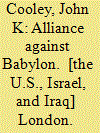

|
|
|
|
|
| Publication |
London, Pluto Press, 2005.
|
| Description |
xiv, 258p.Hbk
|
| Standard Number |
0745322824
|
|
|
|
|
|
|
|
|
|
|
|
Copies: C:1/I:0,R:0,Q:0
Circulation
| Accession# | Call# | Current Location | Status | Policy | Location |
| 049436 | 935.02/COO 049436 | Main | On Shelf | General | |
|
|
|
|
| 3 |
ID:
165094
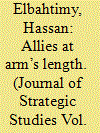

|
|
|
|
|
| Summary/Abstract |
This article examines Egyptian–Soviet relations in the run up to the 1967 Arab–Israeli war. It argues that Egypt and the Soviet Union stumbled into brinkmanship with little coordination and no agreement on common objectives or goals. The article demonstrates how frustration and mutual disappointment were recurring features of the interactions between the two allies during the critical weeks prior to the war. In doing so, the article exposes new aspects of how Cairo and Moscow managed their alliance and assesses what that means to our understanding of the origins of this transformative war. These conclusions challenge revisionist accounts that attribute the start of the war to Egyptian–Soviet collusion and some traditional narratives that present the Soviet Union as an enterprising risk-taker invested in regional brinkmanship. The article draws heavily on Egyptian and Arabic language sources to examine Egyptian–Soviet interactions during this key period of Middle Eastern history.
|
|
|
|
|
|
|
|
|
|
|
|
|
|
|
|
| 4 |
ID:
190115
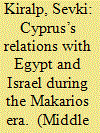

|
|
|
|
|
| Summary/Abstract |
The Makarios era (1960–1977) corresponded with two major regional disputes, with wide implications on international peace and regional politics: the Cyprus issue and the Arab–Israeli conflict. Given that these disputes are still ongoing, this study utilises diverse primary and secondary sources to analyse Cyprus’s relations with Egypt (United Arab Republic) and Israel in the Makarios period, using both political and economic perspectives. The study demonstrates that Cyprus and Egypt’s diplomatic cooperation was built on reciprocal support extended by Nasser towards the Greek Cypriots and Makarios towards Egypt in the Arab–Israeli dispute, especially in international forums such as UN debates. Although Israeli foreign policy did not threaten Cyprus directly, both Cyprus and Egypt considered Turkey a common threat. However, despite the Cypriot government’s pro-Arab stance in the Arab–Israeli conflict, Cyprus had strong relations with both Israel and Egypt concerning the economy, culture, archaeology, medicine, and telecommunications.
|
|
|
|
|
|
|
|
|
|
|
|
|
|
|
|
| 5 |
ID:
094621


|
|
|
| 6 |
ID:
131777
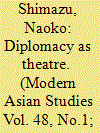

|
|
|
|
|
| Publication |
2014.
|
| Summary/Abstract |
As a significant 'moment' in twentieth-century international diplomacy, the rise of post-colonial Afro-Asia at the Bandung Conference of 1955 is replete with symbolic meanings. This paper proposes a conceptual approach to understanding the symbolic dimension of international diplomacy, and does so by ruminating on the newly unearthed Indonesian material on the Bandung Conference. To this end, 'diplomacy as theatre' is introduced as an interpretive framework to re-cast the conference as a theatrical performance, in which actors performed on the stage to audiences. Focusing on the city of Bandung, this paper reconstructs some examples of the 'performative' dimensions of international diplomacy, and elaborates on the notion of 'staging' the city and the role played by the people of Bandung, including the significance of conference venues, as well as the impromptu creation of a ritual citation that contributed to an iconic 'performative act' during the conference. Sukarno, Nehru, Zhou Enlai and Nasser all understood the importance as performers in their role as new international statesmen, representing the esprit de corps of the newly emergent post-colonial world. In deconstructing the symbolic, it will become evident that the role played by Indonesia significantly influenced the underlying script of the diplomatic theatre which unfolded at Bandung.
|
|
|
|
|
|
|
|
|
|
|
|
|
|
|
|
| 7 |
ID:
103394
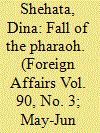

|
|
|
| 8 |
ID:
167657
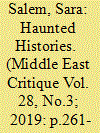

|
|
|
|
|
| Summary/Abstract |
This article revisits the Nasserist project through the lens of haunting. It explores the afterlives of Nasserism, in particular in relation to Egypt’s move toward a free market economy from the 1970s onwards. To do this, I explore the Nasserist project in order to excavate some of the promises that were made and to trace the legacies these created. I argue that both these promises—only partially fulfilled—and the social violence they at times contained—continued to act as powerful political memories that limited Egyptian politics in the decades that followed. Thinking of Nasserism as a form of haunting allows for a deeper understanding of how different political projects seep into one another, problematizing the notion of a linear teleological or providential trajectory consisting of distinct eras. In distinction to work that has mobilized the concept of haunting (originally theorized by Jacques Derrida) in order to elaborate on the historical manifestation of damaging or violent legacies in the present, I argue that Nasserist forms of haunting should be read as both a productive and destructive normative force in the present. This article puts forward examples of both, particularly in relation to questions of social justice, socialism, and anti-imperialism.
|
|
|
|
|
|
|
|
|
|
|
|
|
|
|
|
| 9 |
ID:
103392
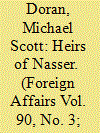

|
|
|
| 10 |
ID:
114870
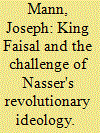

|
|
|
|
|
| Publication |
2012.
|
| Summary/Abstract |
The purpose of this article is to examine the relations between Egypt and Saudi Arabia from the time of King Faisal's rise to power until President Nasser's death, via various events that shaped the Middle East. The article will also examine the main points of disagreement between the two countries, as well as the threat to the stability of the Saudi regime posed by the Egyptian President during those years. Finally, the research will examine the influence of President Nasser's death on Saudi-Egyptian relations and on the Middle East in general.
|
|
|
|
|
|
|
|
|
|
|
|
|
|
|
|
| 11 |
ID:
029576
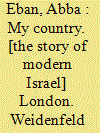

|
|
|
|
|
| Publication |
London, Weidenfeld and Nicholson, 1972.
|
| Description |
304p.hbk
|
| Standard Number |
029799526X
|
|
|
|
|
|
|
|
|
|
|
|
Copies: C:1/I:0,R:0,Q:0
Circulation
| Accession# | Call# | Current Location | Status | Policy | Location |
| 011320 | 956.9405/EBA 011320 | Main | On Shelf | General | |
|
|
|
|
| 12 |
ID:
025721
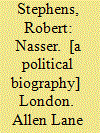

|
|
|
|
|
| Publication |
London, Allen Lane the Penguin press, 1971.
|
| Description |
635p.Hbk
|
| Contents |
Includes index.
|
| Standard Number |
071390180
|
|
|
|
|
|
|
|
|
|
|
|
Copies: C:1/I:0,R:0,Q:0
Circulation
| Accession# | Call# | Current Location | Status | Policy | Location |
| 007730 | 923.162/STE 007730 | Main | On Shelf | General | |
|
|
|
|
| 13 |
ID:
027287


|
|
|
|
|
| Publication |
London, Collins, 1975.
|
| Description |
285p.hbk
|
| Standard Number |
0002116537
|
|
|
|
|
|
|
|
|
|
|
|
Copies: C:1/I:0,R:0,Q:0
Circulation
| Accession# | Call# | Current Location | Status | Policy | Location |
| 015284 | 956.048/HEI 015284 | Main | On Shelf | General | |
|
|
|
|
| 14 |
ID:
144971
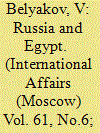

|
|
|
|
|
| Summary/Abstract |
IN AUGUST 2015, one more page was written in the dynamic history of Russian-Egyptian relations. Egyptian President Abdel Fattah al-Sisi paid an official visit to Moscow on August 24-25. He held negotiations with Russian President Vladimir Putin on a wide range of subjects, both bilateral issues and aspects of the situation in the Middle East in general.
|
|
|
|
|
|
|
|
|
|
|
|
|
|
|
|
| 15 |
ID:
103523
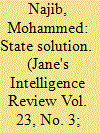

|
|
|
| 16 |
ID:
079233
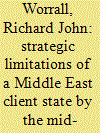

|
|
|
|
|
| Publication |
2007.
|
| Summary/Abstract |
This article looks at how Libya - a British client state under the Anglo-Libyan treaty - refused to allow Britain the use of forces and bases in that country for operations against Egypt during the summer and autumn of 1956. The subsequent restrictions over the use of Libya was shown over the movement of the 10th Armoured Division for 'training exercises' on the Cyrenaican-Egyptian border during early August and later manifested in a written request that the bases would not be used in connection with the operations in Egypt. What emerges is that the decision of the British government to acquiesce to this Libyan demand on 1 November 1956 was taken against the prospect of a 'second front' being opened up in Libya in which urban fighting there would take place there alongside the main operation against Egypt.
|
|
|
|
|
|
|
|
|
|
|
|
|
|
|
|
| 17 |
ID:
029602
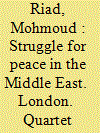

|
|
|
|
|
| Publication |
London, Quartet books, 1981.
|
| Description |
365p.hbk
|
| Standard Number |
0704322978
|
|
|
|
|
|
|
|
|
|
|
|
Copies: C:1/I:0,R:0,Q:0
Circulation
| Accession# | Call# | Current Location | Status | Policy | Location |
| 020799 | 956.04/RIA 020799 | Main | On Shelf | General | |
|
|
|
|
| 18 |
ID:
040247


|
|
|
|
|
| Publication |
London, Jonathan Cape, 1978.
|
| Description |
xiv, 282p.: ill., maps, figureshbk
|
| Standard Number |
022-016601
|
|
|
|
|
|
|
|
|
|
|
|
Copies: C:1/I:0,R:0,Q:0
Circulation
| Accession# | Call# | Current Location | Status | Policy | Location |
| 018207 | 962.050924/LLO 018207 | Main | On Shelf | General | |
|
|
|
|
| 19 |
ID:
039584


|
|
|
|
|
| Publication |
London, MacDonald, 1967.
|
| Description |
xiv, 174p.hbk
|
|
|
|
|
|
|
|
|
|
|
|
Copies: C:1/I:0,R:0,Q:0
Circulation
| Accession# | Call# | Current Location | Status | Policy | Location |
| 014349 | 956.046/MAC 014349 | Main | On Shelf | General | |
|
|
|
|
| 20 |
ID:
122048
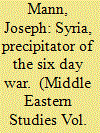

|
|
|
|
|
| Publication |
2013.
|
| Summary/Abstract |
The Six Day War is renowned for its impact on the shaping of the Middle East. In the last few decades, much research examining the reasons for the outbreak of the Six Day War, its development and its ramifications has been published. Most of the research has focused on an examination of Israeli government policy before and after the war, on the Egyptian regime's hatred of the 'Zionist entity' and on the involvement of the superpowers during and after the war. Some research has also touched on Syria's role in the outbreak of the war. Researchers such as Eyal Zisser and Moshe Maoz have shown Syria's decisive role in initiating the war and suggest that various factors, such as a lack of government stability in Syria, precipitated the conflict. This research continues, to a great extent, in the line of those researchers: indeed, it points to Syria as being the main factor behind the outbreak of war through an examination of the changes that occurred in the character of its government from 1966. However, unlike other research so far, this attempts to show that the unique character of the neo-Ba'ath regime is what brought war to the region and that, had the Ba'ath coup not occurred in 1966, it is doubtful whether Syria would have entered the conflict. This article seeks to emphasize that the Syrian regime went blindly into the war despite military unpreparedness and a lack of political and military cooperation with other Arab countries and with the Soviets. It also exposes, for the first time, the state of the Syrian troops on the front and in the cities, as well as the feelings of the senior officers on the eve of the war, and reveals documents about the military and political cooperation between Syria and Egypt that would eventually force President Nasser to enter a war he did not want to get involved in. Moreover, the research exposes the deep rift - which many believe pushed Syria to take rash independent measures -between the Soviet leadership and the Ba'ath regime before the war. And, finally, the research exposes the atmosphere in Syria following the war, and the administrative and military steps the Syrian regime took immediately after the defeat in order to consolidate its power.
|
|
|
|
|
|
|
|
|
|
|
|
|
|
|
|
|
|
|
|
|